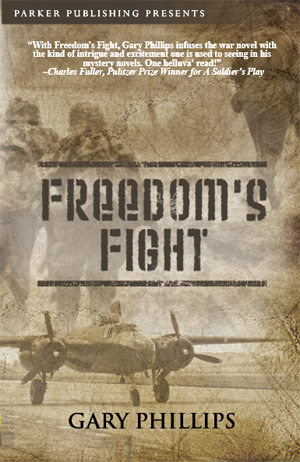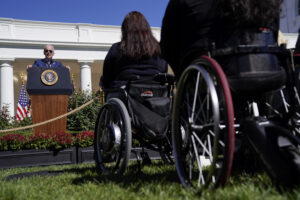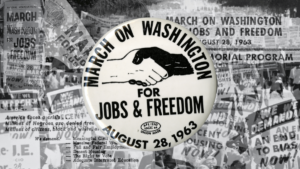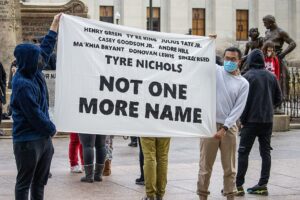Freedom’s Fight: Part II
Truthdig is pleased to present the second excerpt from Gary Phillips’ novel “Freedom’s Fight,” which interweaves real historical figures and situations in a fictive narrative about World War II, focusing not just on the black soldier’s struggle, but also on the debates various civil rights groups had about the war stateside. This second installment from Gary Phillips' historical novel "Freedom's Fight" focuses on black soldiers in World War II.
Editor’s note: This is the second installment in Truthdig’s two-part series featuring Gary Phillips’ historical novel, “Freedom’s Fight.” To read the author’s introduction, as well as Chapter 2, click here.
May 1943 – Washington, D.C.
Colonel Snow reread the report from his operatives, Palmer and Birch. The two had followed the colored girl reporter to a hotel frequented by Pullman Porters and watched her depart. They were certain she’d gone to see Bascome, probing into his brother’s death. But a subsequent visit the two paid on Bascome later that day assured them he did nothing to encourage her investigation.
A quicksilver sneer played with the colonel’s lower face as he put the report back in its file folder. He hoped their “visit” with Bascome had left him mobile. Snow was not like his peers in their assessment, or rather, their noblesse oblige when it came to the negro race. He was not so dismissive of the black press as he knew his two men in New York were. Snow had done his own checking into Alma Yates’ background. Like a lot of modern colored women, she and her ilk had been pushed by her parents to do better than their forebears had done.
A tomboy from Waycross, Georgia, she’d shown brightness and eagerness early. Her mother had wanted her to become a school teacher. But Yates, who’d lost a tooth scrapping with the school yard bully when she was 12, had her own mind. She did two years at Spellman, working nights, and jumped at the chance to work as a summer intern at the Pittsburgh Courier. He could tell in just the crisp type recounting her young life she had the same hunger for something else nesting in her that took him, long ago, from the small patch that was the family farm in Arkansas City, Kansas.
The hunger that he carried with him on the battlefields of World War I. From scared shitless private to seasoned sergeant in command of doughboys in the Meuse-Argonne. But he’d found that something to satisfy that need. It wasn’t the killing, but the plotting, the strategy and craft you developed to keep you and your men alive amidst the majesty of slaughter. That native cunning was noticed and after the Great War he was recruited into the Cipher Bureau where his sharp mind found yet another plateau to attain. And so it went. Now he was a commander in X-2, the manipulators behind the intelligence operations of the armed forces.
He’d decided, before becoming a soldier, despite the pleadings and threats of his father, to never be a sod buster. He couldn’t see getting up before dawn to plow and plant and fret and scrimp to raise crops and cattle only to repeat that process over and over again until the grave. What kind of life was that? Honor in hard work his old man, a straight-backed Pentecostal lay preacher would hammer at again and again. Him sitting and smoking his pipe in the rocking chair his father had made, contemplating crop cycles and the lord’s infinite unknowable. His pa was stiff-neck proud of the land, the gift from a father who’d fought the Indians for the dirt plot and spilled more blood of the renegade Red Legs after the Civil War to keep the farm.
For the first time he could ever remember his father had cursed. He’d screamed at the young man, his hair already turning white and not yet eighteen, who literally and figuratively turned his back on his heritage as he left for the depot to report for basics. His mother, arms around his younger sister, Claire, silently crying in the doorway.
The movieola in his mind flickered and went dark at a knock on the door. Snow quietly said, “Enter,” and calmly placed the file on Alma Yates underneath some others. His guest was too observant for him to leave it in plain sight. Madison Clay entered and saluted.
“At ease, sergeant. Have a seat.”
“Thank you, sir.” Clay folded his six four frame onto the old-fashioned school house chair.
Snow had already removed another file from his organized pile. He laid it flat, his fingers, like spider’s legs, straddling the thin cardboard. “This will be a most curious experience, for someone such as yourself.”
“I’ll do my best, sir.” The tall man sat ramrod straight, no emotion obvious on his angular features.
“Of that, I have no doubt, sergeant. Of course, the ironic part is that outside of the two of us, and a few others you’ll never meet, no one will no of this operation.”
“That’s as it should be.”
Snow opened the file. “But a shame nonetheless. Particularly when negro leaders are decrying the War Department’s manufactured impediments to using the colored man in combat.”
Clay didn’t respond, didn’t blink.
Snow went through the motions of reviewing the material before him, but he knew it cold. There was no one better suited for this assignment than Clay. Even the rednecks in the branch had to admit that. Clay had a Ph.D. in chemistry from Tuskegee, spoke four other languages, and had fought in Spain with the Abraham Lincoln Brigade. He’d been one of 100 black Americans along with some 3,200 whites from the States that had done so.It was that premature anti-fascist activity that had earned he and the others files compiled by that prancing queen J. Edgar Hoover and his FBI. In particular, Hoover was adamant that the 100 negroes be hauled before Congress and charged with sedition. He was virtually pathological, Snow had observed more than once, in his hatred of any black who dared raise his head above the rabble.
From the man’s own comments and memos Snow had seen, Hoover intensely believed that a black messiah would rise up and portend the demise of white civilization as God and Walter P. Chrysler knew it. That’s why Hoover had been so fervent in hounding Marcus Garvey and A. Philip Randolph, the union head. But his mania produced copious entries, and thus when Snow was scouring around to fill this slot, he was pleased that ball licker Hoover was so thorough in the information he’d compiled on Clay.
Almost, he covertly prided himself, as complete as the dossier Snow had amassed on Hoover, the Jew hating Henry Ford Eleanor Roosevelt and her lesbian dalliances, and many others. It all came back to the plotting.
“You were saying, colonel?”
“You will depart at 0100 hours tomorrow by special troop transport from our hanger at National. You will fly to RAF group headquarters in Uxbridge, outside of London, and from there change planes for Egypt. Once there you will acquire your Senegalese passport and other papers establishing your new identity. Then you will be placed aboard the freighter El Farouk with Algerian registry that will take you to Tunis.
“Beside the pilots, am I the only one on that plane?”
“Yes, why?”
“Just wondering,” he said evenly.
Snow was troubled, was that an ironic comment? Was he saying something about him being a negro and no whites would want to be with him in such close quarters?
After two months of concentrated training and observing the man, he still could not get an accurate fix on the sergeant. One of his strongest traits was the ability to read people, to get a sense of what they wanted. For if you knew what they wanted, you knew how to control them. But Clay, since the inception, had manifested neither surprise nor gratitude at being plucked out of the hell of Camp Van Dorn in Centerville, Mississippi. The sergeant had already been in two serious dust ups with white soldiers, and Snow found him beaten and untreated in the brig. He was silent but not sullen, like he was awaiting purpose. As if he only lived from moment to moment. That could make him dangerous to the enemy, and possibly to Snow if he survived this assignment.
“And it’s clear how you report?”
“Yes, I’ve committed to memory where the short wave is located and I know how to use one.”
“And if the radio is found?” Snow pressed.
Unwavering he responded. “Then I better be on the run. Because that will mean the operation is compromised, and my identity has been exposed.”
“What would you do to survive?” a curious Snow asked.
“What ever was in my power,” Clay said. His tranquil demeanor slipped momentarily and there was a glimpse of a will forged in the furnace of adversity. Then it went away, the composed expression Clay presented to the world firmly back in place.
Snow appreciated the man’s candor. So there was something he wanted after all. “I can’t emphasize how important this mission is, Clay. If you can glean the information we believe is to be available in the French embassy, you will have done a great service to your country. Operation Torch has been successful in penetrating that part of Northern Africa, but the job is not complete.”
“Too bad my country will never be aware of my actions. It would do so much,” he added in what might have been a wistful tone.
“Yes, that is a shame.” He closed the file folder, indicating the meeting was at an end. “Anything else, sergeant?”
“No.”
“Your dismissed then. Get some rest.”
Clay stood, saluted and left the room. Snow interlaced his fingers. He glowered at the door the other man had just gone through. The colonel was as much worried about the success of the operation as he was figuring out what to do with Clay should he return. Surely the negro didn’t expect a career in the intelligence bureaus? Maybe J. Edgar could use him to spy on some of these loud mouths like Ranon Bowlden or this new fellow, Elijah Poole who was now calling himself Elijah Muhammad. He was running around the east coast spouting some sort of crazy religion mixed in with race pride, calling the white man the blue-eyed devil and what not. But Snow didn’t really believe that was the kind of work Clay would want to do. No, he decided, Clay would have to be handled just like Yates was going to have to be dealt with if she persisted. These new negroes were getting to be a handful, he reasoned. Too many of them wanted too much too fast. Everybody had to know their place, and the role they played. Yes, he would make sure of that as far as Miss Yates and the self-possessed Madison Clay were concerned if he had to.
Your support matters…Independent journalism is under threat and overshadowed by heavily funded mainstream media.
You can help level the playing field. Become a member.
Your tax-deductible contribution keeps us digging beneath the headlines to give you thought-provoking, investigative reporting and analysis that unearths what's really happening- without compromise.
Give today to support our courageous, independent journalists.







You need to be a supporter to comment.
There are currently no responses to this article.
Be the first to respond.